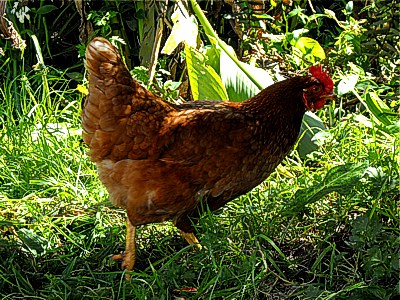Egg Production
Ooh eggs for breakfast.........hold on!
From backyards into the corporate world, the egg production business is now mainly separated into 3 areas, free range eggs, battery farmed eggs and barn laid eggs. The main type of egg production being battery farmed eggs, they are cheap to produce and cheap for the customer. Other forms include organic eggs, vegetarian eggs and omega-3 enriched eggs. So far I’m just listing what the names are for the different types but what makes each form different to the other?

The main one battery farmed eggs are also the ones that are causing the most controversy around the world. This is mainly because of the conditions that the chickens are kept in to produce their eggs. In most cases in battery farms the chickens are kept in tiny indoor cages, stacked one over the other. I would hate to be the chicken at the bottom.
The cages are barely bigger than an A4 sheet of paper, considering the size of a chicken. A fully grown chicken is about the size of a watermelon. Obviously these cages do not allow room to even turn around. Being confined to a cage also deprives the chicken of carrying out natural chicken behaviours like foraging, perching or
scratching and privacy is also unattainable.
Probably one of the most private
things in the world is
an egg until it is broken.
--M. F. K. Fisher--
"Food To Grow"
Receive a free to download 27-page e-booklet:
Banana Smoothie Recipes For Kids
and subscribe to our monthly newsletter filled with new recipes, ideas and insights.
The horrible practices that go on in the battery farming business have been at the forefront of activist campaigns for years. Like the process of debeaking were the bird’s beak is trimmed to hinder pecking, equally as horrible is the discarding of unwanted male chicks and discarding in general of the chickens that are past there due by date and can no longer fill the requirements expected of them.
Commercial battery farming is already banned in many countries while other countries like England are taking steps to do the same. To prevent the high risk of disease and aid the process of keeping such a large amount of chickens in such a small area, the battery farmed chickens are pumped full of vitamins and hormones for growth and antibiotics to keep diseases at bay. There is no doubt that these drugs
will find some way of getting into the eggs themselves and then into you the customer.
A happy egg means a healthy egg right. Well it would sure help your conscience knowing that the chicken that laid your egg was happy to do so. There is no doubt that battery farming is not natural, the chickens do not even get to experience the outside world, never feel the warmth of the sun on their skin, never take a breath of fresh air.
They are confined to an unnatural controlled environment where it is warm year round to increase egg production where chickens would normally lay less eggs in the winter, they experience longer days and shorter nights. Battery farmed chickens are forced to live shorter lives and lay more eggs all because us greedy humans want our eggs cheap.
It’s horrible to know that our food can come from such cruelty and to buy it just because it is cheap is basically buying into slave labour. If it is wrong to keep humans in this condition why do it to other living beings. Now after hearing so much about battery farmed eggs, it is time to go on to the other methods of egg production that are deemed more respectable.
Methods of egg production
Barn laid eggs, it’s all in the name eggs laid by chickens that are kept in a barn they are not generally free to roam outside but have more space for socialising and most importantly are not kept in cages.
Free range eggs are a step up form barn laid eggs, free range egg farming is a process of egg production that allows the chickens to walk freely outside, as well as having the chance to hide away inside. It is not a preferred method for intensive egg farmers out for a large profit quickly because the chickens tend to lay fewer eggs because they are kept both inside and outside and therefore go with the seasons.
Free range egg farming results in a happy chicken and a longer life, full of fresh air.
The other types of egg farming are what I call specialised methods. Organic eggs
come from chickens who have experienced and been feed only on an organic diet, free from pesticides and other additions.
Vegetarian eggs derive from chickens who have been solely feed on a vegetarian diet so no meat bi-products. Finally omega-3 enriched eggs from chickens feed on a diet particularly high in omega 3-acids which results in eggs that are higher in omega-3 acids than other eggs.
The type of egg production only influences the egg nutrition through the chicken feed. Not through how they are kept. From asking a major contributor to the New Zealand egg industry, on what he feeds his chickens, he answered that he feeds his free range, his barn and his battery hens the same feed. So no wonder they do not show much nutritional differences. The choice between free range, barn and battery
would be either a price choice or an ethical choice. The difference in choice starts with the specialised eggs, vegetarian, organic and omega-3 enriched eggs.
Use the FB plug-in to comment or share your thoughts about egg production.
Related articles:
Why question genetic modification?
Egg production, where are the differences?
Factory farming vs organic farming, why would we prefer one above the other?
What do you know about the pros and cons of raw milk?
Are whole grains healthy?
